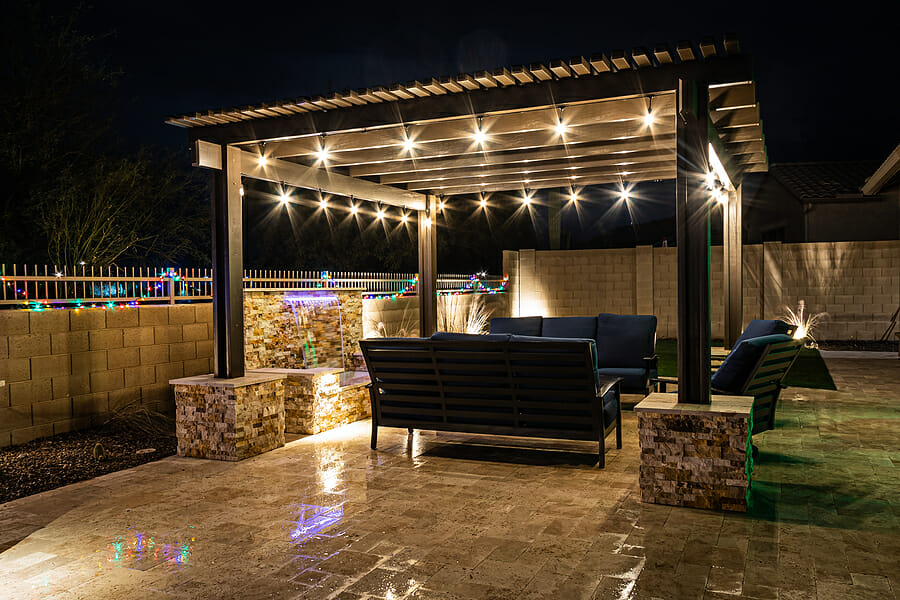If your plot of land is big enough, you won’t have to worry about privacy. But if your house is relatively close to the houses of your neighbors, privacy becomes a much bigger concern. What steps can you take to improve the level of privacy available to you in your backyard?
Fences
One of the best and most permanent options for improving your privacy is building a fence. Constructing a fence is probably going to cost you a few thousand dollars, depending on the materials you use and your source of labor, but it can serve you and your property well for years, if not decades, as long as you maintain it properly.
There are several viable materials you can use to create a privacy fence.
- Wood. Wood is arguably the most classic and available option on this list. It’s relatively inexpensive, it’s durable, it can be painted and constructed in many different ways, and many people love the aesthetics. However, wood is susceptible to rot and wood fences generally require more maintenance than other types of fences.
- Vinyl. Vinyl is a relatively new material for privacy fences because, until recently, it was susceptible to discoloration and sag over time. Modern vinyl fences are much sturdier and more reliable, and because vinyl is such an inexpensive material, it’s an excellent fit for many homeowners.
- Metal. Wrought iron and corrugated metal fences are also available options. As you might expect, metal fences are some of the strongest and most durable, but they also are some of the most expensive. Additionally, because metal fences corrode, they may require more maintenance than fences made from other types of materials.
- Rocks. If you love the visual element of stone and rocks, you could even construct a privacy fence out of these geological marvels.
Plants
Various plants and garden options can also improve your backyard privacy. Ranging from tall to short and from stout to thin, different types of plants provide different levels of visual coverage. You can use them around your property to obstruct the view from many angles, or use them around a patio or structure for more concentrated privacy and visual protection. As an added bonus, many of these plants provide shade, which is indispensable during hot summer months.
- Trees. Trees tend to be tall and relatively easy to maintain, though there are many different types of trees with different strengths and weaknesses to consider.
- Shrubs and hedges. Shrubs and hedges tend to be shorter, and they generally require more trimming and upkeep. Again, there are countless varieties to choose from here.
- Hanging gardens. If you have an existing structure, you can use hanging and dangling plants to fill in the gaps and obstruct vision.
- Living fences. You can even create a living fence, turning your existing fence into a veritable hanging garden.
Structures
Pergolas, gazebos, and canopies are all very similar in structure, though there are some subtle differences between them. In any case, these structures won’t provide total privacy the way a privacy fence will, but they can provide shade, an aesthetically pleasing gathering space, and some line of sight blocking.
Ornamental walls and curtains also fall into this category.
Other Strategies for Improving Privacy
There are a few other strategies you can use to incorporate more privacy into your backyard life:
- Add a fountain. If you add a running fountain to your backyard, it can provide background noise that drowns out the sound of your voice (and the sounds other people make).
- Include some background music. Similarly, outdoor speakers can give you auditory occlusion and privacy as well.
- Perfect the lighting. Bright lighting may illuminate your backyard, but it also illuminates you. Choose softer forms of background lighting to retain your privacy in the dark.
- Talk to your neighbors. If you’ve tried many of the privacy strategies listed above, but your neighbors are making it hard for you to feel secure, or if they are repeatedly violating your privacy in some way, have an honest chat with them. Most people are well-intentioned and willing to work with you as long as you’re polite and straightforward with your requests. If your neighbor repeatedly continues to ignore your requests or violate your boundaries, you may need to escalate the situation; depending on where you live, that could mean contacting your HOA, investing in better privacy measures to make privacy violations practically impossible, or even calling the police.
Your backyard may never be perfectly private, but you will feel safer, more secure, and freer to be yourself when you follow these strategies. If you still find yourself wishing for more privacy, it may be in your best interest to move to a more remote location.
Image Source: BigStockPhoto.com (Licensed)
Related Categories: Home, Reviews








